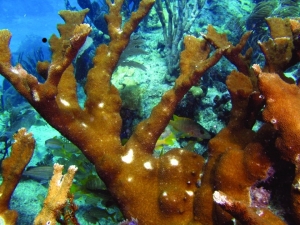Coral reefs worldwide are in severe decline. In the Caribbean, the once common reef-building elkhorn coral (Acropora palmata) is showing high rates of decline due to bleaching, hurricanes, and disease. In the Florida Keys, 87% of the population has already been lost. Since 1996, the majority of this loss has been attributed to a previously unknown epizootic, white pox. One of the agents of White pox disease in eklhorn coral is a human strain of the enteric bacterium, Serratia marcescens. Our labs are using field surveys, microbiology, genomics, epidemiology and mathematical modeling to explore how pathogens from humans infect wildlife, rather than the reverse. Additionally, because of the link between under-treated human sewage and coral disease, this project also integrates basic principles of environmental health but with novel applications to wildlife disease rather than human disease.
Students will have the opportunity to combine field and laboratory work to study questions related to the transmission of white pox disease in the Florida Keys over space and time, the ecology of coral microbial communities, the search for new pathogens and the interaction between water quality and disease susceptibility.
